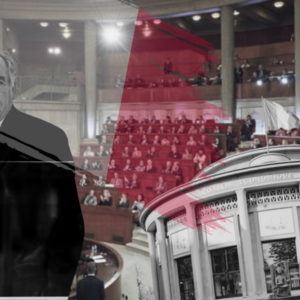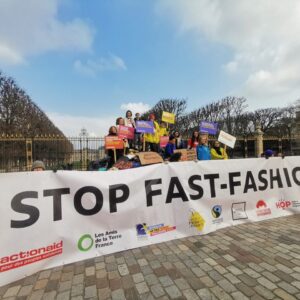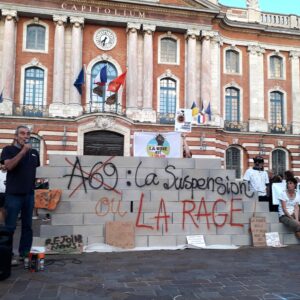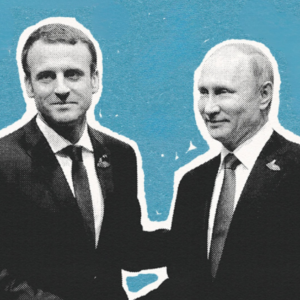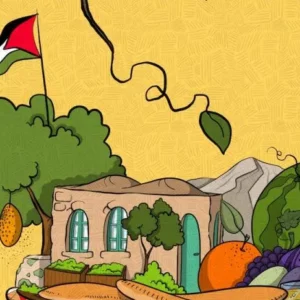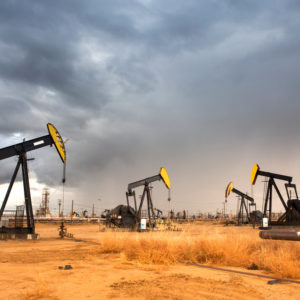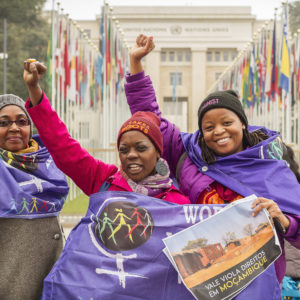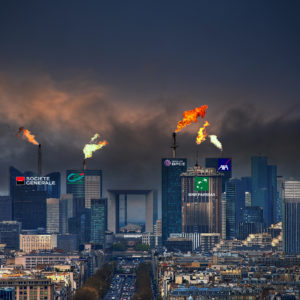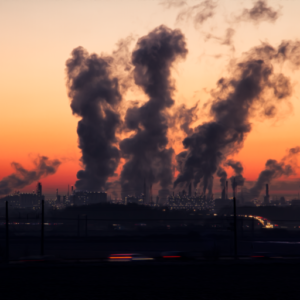
France finally proposes to ban public support for new oil and gas projects
The government is proposing in the Budget Bill to end export finance for new oil and gas projects, with the exception of oil and gas power plants.
After years of mobilization of civil society, this is a decisive step that could encourage other countries to commit, and thus redirect billions of euros to the energy transition. Friends of the Earth France and Oxfam France call on MPs to vote for this proposal and to go further by applying the same ban on gas power plants.
The Budget Bill presented this morning by the Minister for Finance, Bruno Le Maire proposes that the French state cease granting support in the form of export guarantees1 to almost all oil and gas projects, from exploration to distribution, as of the end of this year. One notable exception remains: oil and gas power plants are not covered2. This is a major step forward at a time when putting an end to the expansion of fossil fuels has become a priority to limit global warming to 1.5°C3. This new French policy finally recognizes this urgency: the previous strategy, adopted in 2020, allowed support for new fossil fuel projects until 2025 and 2035, and did not exclude transportation or storage projects.
Between 2009 and 2019, France had granted 9.3 billion euros in export guarantees to fossil fuels4, for example in the Russian Arctic or Mozambique. In July 2019, the NGOs Friends of the Earth France, Oxfam France and the Climate Action Network warned about the counter-sense of continuing to subsidize fossil fuels in a context of climate emergency5.
Alexandre Poidatz, finance and climate advocacy officer at Oxfam France, is delighted: « Three years after the commitments made by Emmanuel Macron at the UN podium in September 20196, and then at COP26 7, France is finally enshrining in law its promise to stop supporting new fossil fuel projects abroad by the end of 2022, with the exception of oil and gas power plants. Although incomplete, this decisive step forward can also be credited to the active mobilization of civil society over the past several years8. »
The proposal has two weak points: it allows support for oil and gas-fired power plants. However, investing today in this type of project and building the dependence of regions on fossil fuels for the next few decades is neither beneficial for the climate nor for the energy transition of countries in the South. This diverts capital from real solutions, in energy savings, thermal renovation and energy efficiency, and slows down9 the development of renewable energies, which are already competitive and whose huge potential, particularly in Africa, is largely under-exploited 10.
In addition, another element of the policy requires our vigilance: the support for projects that “reduce the negative environmental impact of existing installations”. This means that the state could be supporting immature and very expensive technologies such as carbon capture and storage for the benefit of fossil fuel giants and thus diverting urgently needed public support for solutions that are proven to reduce greenhouse gas emissions, such as the deployment of renewable energy and energy efficiency11.
Anna-Lena Rebaud, Campaigner at Friends of the Earth France concludes: « While France dragged its feet12 in committing to end such support at COP26 and the war in Ukraine is being used as a pretext for many countries to continue supporting gas expansion, the new French policy sends a strong signal to the international community. Countries must immediately end support for fossil fuels, and not support the development of gas abroad to replace Russian gas, as Germany is doing in Senegal13.
If all the countries that signed the Glasgow Declaration committing to end public support for fossil fuels redirected their support away from fossil fuels, $28 billion could go to projects supporting a just energy transition14. It is also a strong signal to private financial institutions, and in particular to French banks, which have contributed $350 billion to fossil fuels between 2016 and 202115.
PRESS CONTACTS
Anna-Lena Rebaud, campaigner at Friends of the Earth France : 07 57 18 68 72 anna-lena.rebaud@amisdelaterre.org
Alexandre Poidatz, campaigner at Oxfam France : 06 85 26 37 18 apoidatz@oxfamfrance.org
The Budget Bill proposes to end guarantees « for the exploration, production, transportation, storage, refining or distribution of coal or liquid or gaseous hydrocarbons, as well as the production of energy from coal, except for operations that reduce the negative environmental impact, improve the safety of existing facilities or their impact on health without increasing their life or production capacity, or aim to dismantle or reconvert these facilities. »
To limit global warming to 1.5°C, the International Energy Agency (IEA) says no new oil or gas fields should come on stream after 2021. Consuming the hydrocarbon reserves already being exploited is enough to make us exceed the 1.5°C temperature limit and 40% of coal mines and oil and gas fields will have to be closed prematurely in order to respect it. According to the United Nations, coal, oil and gas production must decrease by 11%, 4% and 3% annually by 2030 respectively. By 2040, gas-fired power generation will have to be 90% below the 2020 level.
Through its export credit agency (Bpifrance Assurance Export), the French government supports the export activities of companies operating in France by acting as an insurer of last resort. This public insurance, called export guarantees, makes it easier for companies to obtain loans from commercial banks. They thus limit the risks associated with the sale of goods and services on foreign markets, particularly when large sums are involved, or when these sales are made in countries with an unstable economic or geopolitical context.
Ministère de l’Economie et des Finances, Propositions de pistes de modulation des garanties publiques pour le commerce extérieur, 2019, p.9.
Amis de la Terre, Oxfam et RAC Cachez ces fossiles que l’on ne saurait voir – 3 institutions financières publiques à l’épreuve de l’Accord de Paris, 2019.
Ministère de la Transition Ecologique. COP26 : la France signe un accord réaffirmant son engagement à mettre fin aux financements publics à l’étranger de projets d’énergies fossiles. 2021.
Under pressure from citizens, the French government gave up its support for Total’s Arctic LNG 2 project in the Russian Arctic. After having granted a guarantee to the Coral South project in Mozambique, which Friends of the Earth denounced, it finally did not support another project, Mozambique LNG.
Milieudefensie, Locked out of a Just Transition: fossil fuel financing in Africa, March 2022.
Voir p.8 de notre dossier de presse Loi de finances 2023 : vers la fin des subventions aux nouveaux projets d’énergies fossiles ?, September 22, 2022.
Les Amis de la Terre, COP26 : la France rejoint enfin les 30 pays s’engageant à cesser de soutenir les énergies fossiles fin 2022, November 12, 2021
“L’énergie au cœur de la visite d’Olaf Scholz au Sénégal et en Afrique du Sud”, Euractiv, May 25, 2022.
IISD, “Turning Pledges Into Action”, June 29, 2022.
Ran et al., “Banking On Climate Chaos”, March 2021.

